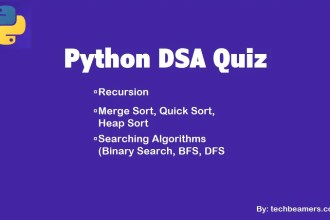Welcome to our Python DSA Quiz – Part 3! This quiz is designed to test and refine your understanding of singly and doubly linked lists. By participating, you’ll explore essential concepts, including insertion, deletion, traversal, cycle detection, and advanced techniques like the fast and slow pointer approach. Whether you’re preparing for coding interviews or looking to strengthen your data structures knowledge, this quiz will help you assess your skills and deepen your understanding of linked lists.
Python DSA Quiz – Part 3
Python DSA Quiz – Part 3 Hints
Here’s a simple table with hints for each question to help guide the user:
| Question | Hint |
|---|---|
| 1. What is the key difference between a singly linked list and a doubly linked list? | Think about the number of pointers each node maintains. |
| 2. What is the time complexity of inserting a node at the beginning of a singly linked list? | Consider that inserting at the head only involves updating one pointer. |
| 3. Which operation is faster in a doubly linked list compared to a singly linked list? | Doubly linked lists allow backward traversal. |
| 4. What happens when you try to delete a node from an empty linked list? | Deleting from an empty list shouldn’t cause errors if handled properly. |
| 5. What is the best time complexity for searching for a node in an unsorted singly linked list? | In an unsorted list, you might need to check every node. |
| 6. How do you reverse a singly linked list efficiently? | Consider how you can swap the links between nodes. |
| 7. What is the purpose of using the fast and slow pointer technique? | This technique helps in detecting cycles and finding the middle node. |
| 8. If a fast pointer moves two steps at a time and a slow pointer moves one step, where will they meet in a cyclic linked list? | The fast pointer eventually catches up inside the cycle. |
| 9. How do you find the middle node of a singly linked list in O(n) time and O(1) space? | Use two pointers with different speeds. |
| 10. Which algorithm is commonly used to detect a cycle in a linked list? | This is also known as the “Tortoise and Hare” algorithm. |
| 11. What happens if you keep traversing a linked list with a cycle using a normal pointer? | There is no endpoint in a cyclic list. |
| 12. How do you remove a cycle from a linked list once detected? | You need to find the node just before the cycle starts. |
| 13. What does the fast pointer do in Floyd’s cycle detection algorithm? | It moves faster than the slow pointer. |
| 14. If a cycle exists in a linked list, what is the time complexity of Floyd’s cycle detection algorithm? | The fast pointer skips nodes but still goes through the list at most twice. |
| 15. What is the main drawback of using a linked list over an array? | Consider memory overhead and access time. |
| 16. Which linked list operation has the worst-case time complexity of O(n)? | Think about operations that require searching for an element. |
| 17. How do you efficiently implement a queue using a linked list? | A queue needs efficient enqueue and dequeue operations. |
| 18. What is the best way to implement an LRU (Least Recently Used) cache using a linked list? | A hash map improves lookup time while a doubly linked list maintains order. |
| 19. Which data structure is most suitable for implementing an undo feature using a linked list? | You need both forward and backward traversal for undo/redo. |
| 20. What is the main advantage of a circular linked list over a singly linked list? | It helps in continuous traversal and efficient queue implementation. |
This should make it easier for users to recall concepts and answer questions correctly! 🚀
Summary: Python DSA Quiz – Part 3
Thank you for completing our Python DSA Part 3 Quiz! In this quiz, we covered fundamental and advanced concepts related to singly and doubly linked lists, including insertion, deletion, traversal, cycle detection, and fast-slow pointer techniques. We hope this quiz helped reinforce your understanding and provided valuable insights into how linked lists work. Check our previous quizzes here.
✅ Python DSA Quiz – Part 1 (Core data structures and algorithms)
✅ Python DSA Quiz – Part 2 (Recursion and sorting algorithms)
Stay tuned for our upcoming quizzes, where we’ll dive into more complex data structures and algorithms to further enhance your Python programming skills. 🚀 You may subscribe to our YouTube channel for more MCQs and coding challenges!





